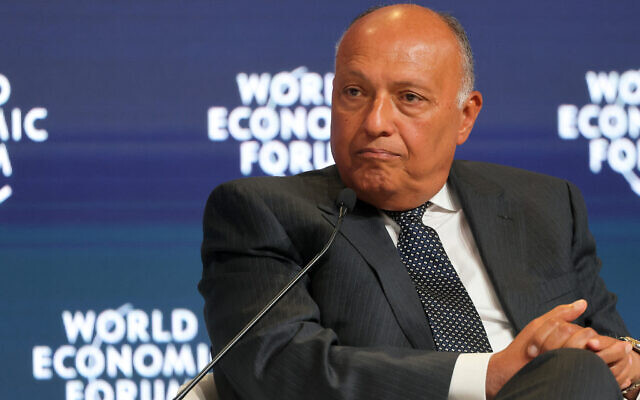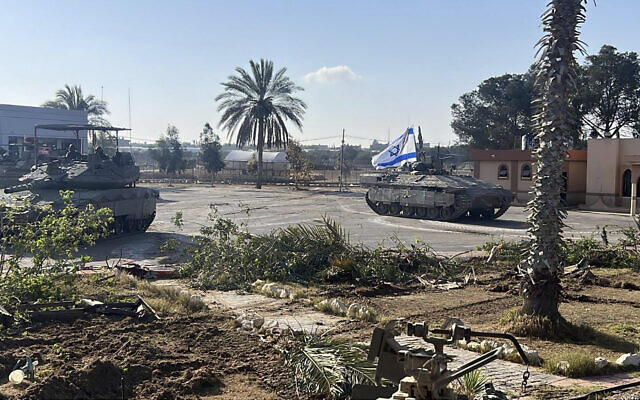by Lazar Berman
Cairo, eager to see war end and economy back on track, is open about its frustrations, but its long-standing interests in preserving deal with Jerusalem have not changed
 |
| Egyptian President Abdel Fattah el-Sissi attends a meeting with US Secretary of State Antony Blinken at Al-Ittihadiya Palace, in Cairo, February 6, 2024. (AP Photo/Mark Schiefelbein, Pool) |
Based on frantic media coverage emanating from Cairo, the long-standing ties between Israel and Egypt seemed like they were about to unravel.
After Israeli troops finally embarked on the ground incursion into the Rafah border area on May 7, Cairo’s public reaction was swift and furious.
“Egypt warns Israel of ‘dire repercussions,’” read a CNN headline.
Unnamed Egyptian officials told reporters the Israeli offensive could endanger the 1979 peace accord between the countries. Other officials warned that diplomatic ties could be downgraded.
Then Egypt’s Foreign Ministry put out a statement that it would join South Africa’s “genocide” case against Israel in the International Court of Justice.
Egypt also halted coordination for aid trucks to pass from its territory into Gaza, insisting that the other side of the Rafah Crossing be under Palestinian control before it resumes deliveries.

“The current situation vis-a-vis Egypt is the worst it has been since the war began,” one unnamed Israel official told the Haaretz daily newspaper.
Then, the threats stopped.
More significantly, Egypt made no move to actually join the ICJ case.
It also hosted a senior Israeli delegation in an attempt to smooth tensions.

The angry declarations from Egypt were to be expected, and do not signal an impending break in ties from a country that has long-standing interests in a multi-faceted relationship with Israel.
But they do reflect deep concerns Egypt has about the persistence of the war between Israel and Hamas, and what might come after.
Deep interests
Egypt’s behavior is driven by core interests — economic, security, and regional — it intends to protect amid the fighting in Gaza.
Egypt is suffering deep economic fallout from the conflict. Even before Hamas attacked on October 7, the Egyptian economy was in a steady decline. Rising debt caused the country to slash social services and basic subsidies over the past decade, and the Russian invasion of Ukraine in 2022 cut off its main sources of wheat imports. Cairo had to devalue the pound in order to receive a crucial loan from the International Monetary Fund, and sky-high inflation continues to climb.

The fighting next door in Gaza has only made a bad situation worse.
One of Egypt’s main sources of foreign currency — which it needs in order to repay almost $200 billion in foreign debt and to import key commodities — is international shipping through the Suez Canal. That traffic has dropped by 50% because of attacks by the Iran-backed Houthis from Yemen on ships sailing through the Red Sea.
Tourism, another key source of foreign currency and a sector that accounts for over 8% of GDP, is also in sharp decline because of the war. (Some Egyptian pundits have surmised that the fact that the Giza pyramids sound similar to Gaza has further deterred tourists.)
On top of those challenges, Egypt has also seen an influx of up to 100,000 Gazan refugees since the war started.
The situation at the Rafah Crossing doesn’t make the economic situation easier for Egypt. With the El-Arish to Rafah corridor providing a significant portion of aid flowing into Gaza, the government was making money by charging processing fees on every shipment.

But it was Cairo that decided to halt aid shipments once Israel hoisted its flag on the Gaza side of the crossing.
The flag was seen in Egypt as a violation of the 2005 Agreement on Movement and Access, which Israel signed with the Palestinian Authority after pulling out of the Gaza Strip. It stipulates that the PA would control the Gaza side of the crossing under European Union supervision. The AMA was effectively suspended after the 2007 Hamas takeover of Gaza, but Egypt wants to see the PA back in control on the border.
“Egypt’s reaction is meant to make clear to Israel that its presence at the border crossings is illegitimate in Cairo’s eyes, and that uncoordinated decisions will have a price – damage to bilateral ties,” explained Ofir Winter, senior researcher at the Institute for National Security Studies in Tel Aviv.
Egypt has another important motivation for its refusal to accept Israel’s presence at the Rafah border.

“It is also meant to signal to critics of the Abdel-Fattah el-Sissi regime in Egypt and in the Arab world that Cairo is not cooperating with Israel on the capturing of the Rafah Crossing,” said Winter.
“If conditions were different, they would prefer we were there all the time,” said Haim Koren, a former Israeli envoy to Egypt and South Sudan and researcher at the Mitvim think tank. “But they can’t say anything like that in times like these.”
Since Egypt signed a peace treaty with Israel in 1979, the first between Jerusalem and an Arab country, its rulers have been vulnerable to criticism from anti-Western states and Muslim Brotherhood supporters at home that it is a collaborator with the Zionist enemy.
That sensitivity is behind the call from Egypt’s Sissi urging Egyptians to take to the streets to protest against Israel before it even started the ground incursion in late October.

“Muslim Brotherhood officials outside Egypt are trying to incite protest and criticism against the Egyptian regime through messages on satellite channels and social networks,” Winter said. “Although it is likely that the majority of the Egyptian public is more concerned with the economic hardship and the daily war of existence than with the war in Gaza, public opinion considerations influence the conduct of the regime.”
Hamas and the Brotherhood
That is not to say Sissi and the ruling elite have any sympathy for Hamas. They see it as an arm of the Muslim Brotherhood, an outlawed political movement founded in Egypt.
Top police, prison and intelligence officials blame Hamas for participating in a mass prison break in 2011 that released over 20,000 inmates, including jailed Hamas members and criminals who fueled a massive crime wave. Among the Muslim Brotherhood leaders freed in the coordinated attack was Mohammed Morsi, the man Sissi overthrew as president then held in prison until his death in 2019.

The regime also accused Hamas of being involved along with the Muslim Brotherhood in the 2016 killing of the country’s top prosecutor Hisham Barakat.
Sissi, who declared the Brotherhood a terrorist group when he came to power in 2014, has been pursuing the organization vigorously, as it represents the main threat to his rule.
In March, an Egyptian court sentenced to death by hanging eight senior leaders of the movement, including two former supreme guides. The Muslim Brotherhood continues to work to bring Sissi down from its headquarters abroad, especially in Turkey and Qatar.

At the same time, there does seem to be some quiet sympathy for Hamas — or at least a willingness to turn a blind eye for money — among Egyptian officers. IDF forces in Rafah have found around 50 cross-border tunnels, which could not have been dug without the knowledge of some security forces on the other side.
Still, the regime wants to prevent a flood of Gazan refugees from pouring across the border into the Sinai, adding hundreds of thousands of mouths to feed and allowing Hamas fighters to link up with Salafi and Muslim Brotherhood terrorists. Cairo remembers when Hamas set off explosions along the border fence in 2008, enabling up to half of Gaza’s population to cross unchecked into Egypt. It took almost a year for Egypt to round up the last of the Gazans in northern Sinai and return them to Gaza.
A golden opportunity
Amid all the pitfalls, if Sissi plays his cards right, the war in Gaza can recast Egypt’s regional standing.
“Egypt sees that this is a golden opportunity to take advantage of the current crisis to find a solution for the Palestine issue,” said Michael Barak, senior researcher at Reichman University’s International Institute for Counterterrorism.
“Egypt is also trying to fortify its image in the Arab world,” he continued, “meaning that Egypt is interested in signaling to the United States that it is a very crucial ally in the region that it is able to bring Israel and Hamas to the negotiating table, and to help reach a ceasefire.”

It will go to significant lengths to try to shorten the war, even at the risk of straining ties with Washington. CNN reported that Egyptian intelligence changed the terms of a hostage deal Israel agreed to without the knowledge of the other mediators. That ham-fisted attempt angered Qatar, the US, and Israel, and talks have been stalled since.
Until it achieves that key aim, Cairo is seeking urgently from Israel clarity over the future of the Gaza Strip and the management of the Rafah Crossing before it agrees to work together on aid or the day after Hamas.
Alongside the denunciations, Egypt has also sent ample signals that it isn’t planning on doing anything too drastic against Israel.

“The peace agreement with Israel has been Egypt’s strategic choice for 40 years, and it represents a main pillar of peace in the region to achieve peace and stability,” Foreign Minister Sameh Shoukry said on the same day his ministry announced it would join the ICJ suit.
After accusing Israel of evading ceasefire efforts, Sissi said last week at the Arab League Summit that “despite the current gloomy picture, Egypt still clings to the hope that the voices of reason, justice and truth will ultimately prevail, saving the region from endless waves of wars and bloodshed.”
Notably — unlike envoys from countries like the UAE — Egypt’s ambassador continues his work from Tel Aviv, and Israel’s envoy does the same in Cairo.
Security cooperation remains close, with delegations quietly going back and forth regularly.
None of this should come as a surprise. Egypt is a country with consistent and deep interests, and decision-makers stay in power for many years.
“They know how many shared interests they have with us,” Koren said.
Lazar Berman
Source: https:https://www.timesofisrael.com/despite-threats-egypt-is-not-about-to-tear-up-peace-with-israel/
No comments:
Post a Comment